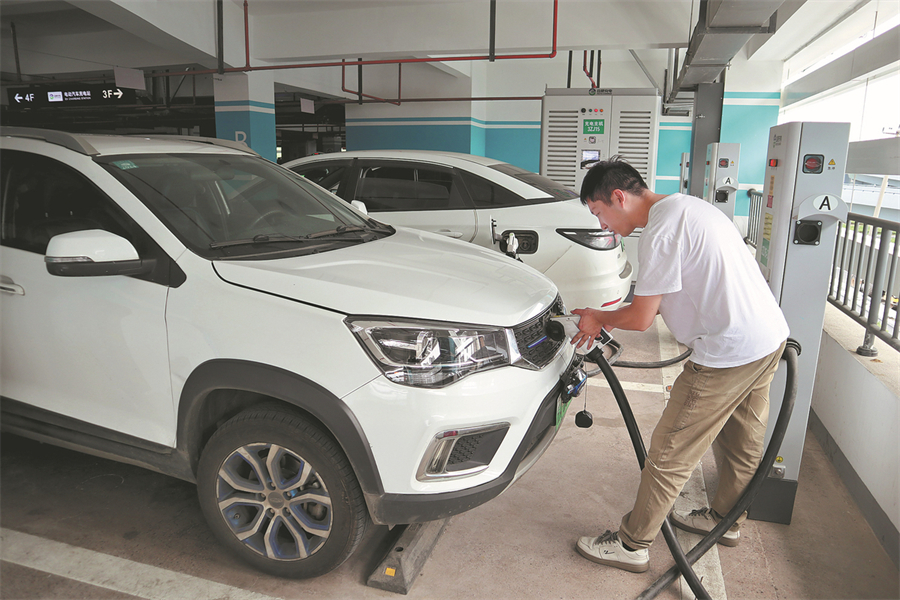Drive to become China's NEV capital

A driver charges his car at a multifunctional new energy vehicle charging station in Hefei, Anhui province, on July 4. [Liu Fangqiang/Xinhua]
HEFEI — As he usually does at 3 pm, Hu Chaohong drove his taxi to a multifunctional new energy vehicle charging station in Hefei, capital of Anhui province.
After scanning a code to charge his car, he went to the waiting room to relax and "recharge" himself.
Operational since late May, the station has five floors above ground and one below, with 185 charging piles for family cars, and 12 for trucks.
The station runs a "charging + business" model, and has a resting area with eateries and convenience stores offering meals and a reading area for drivers, according to Chen Jingjing, deputy director of Hefei's NEV charging facilities investment and operation company. "We aim to offer more services such as car washing, auto repairs, and insurance for drivers in the near future," Chen added.
Compared with outdoor charging stations, this multifunctional station not only protects cars from the wind and rain, but also makes the charging process safer, and drivers don't usually need to wait in line.
"I come to the charging station twice a day to charge my vehicle, and there is also hot water and a bathroom, which is very convenient," Hu said.
In recent years, China's NEV industry has grown rapidly, and charging stations have become important public facilities, helping to guarantee the development and promotion of NEVs.
As the world's largest single market for electric vehicles, China has launched a series of policies to bolster the development of its booming NEV sector, which includes building a complete charging infrastructure network.
In May, the country released a guideline to encourage and support rural dwellers wishing to purchase NEVs, with a focus on boosting the construction of charging infrastructure. By the end of May, more than 6.35 million charging units had been installed nationwide. In addition to building a complete charging network, governments at all levels have also rolled out a raft of policy incentives to spur NEV production and marketing.
In June, Anhui introduced a slew of measures to encourage the formation of an NEV industrial agglomeration. The province plans to boost automobile production to more than 3 million units, some 40 percent of which would be NEVs.
According to official statistics, the output value of Hefei's NEV industrial chain was in excess of 100 billion yuan ($14.02 billion) last year. The city has attracted a number of NEV makers and aims to turn itself into the "capital of NEVs".
"This multifunctional station serves as a model for the construction of charging infrastructure in Hefei," Chen said.
The project has also alleviated the difficulty of charging and parking NEVs in Hefei's economic and technological development zone, where an average daily charging capacity of about 30,000 kWh is able to meet the charging needs of more than 1,000 NEVs, Chen added.
Xinhua
























